
Q&A: Fighting the Silence
Filmmakers describe the challenge of tackling a taboo subject like rape in DR Congo.
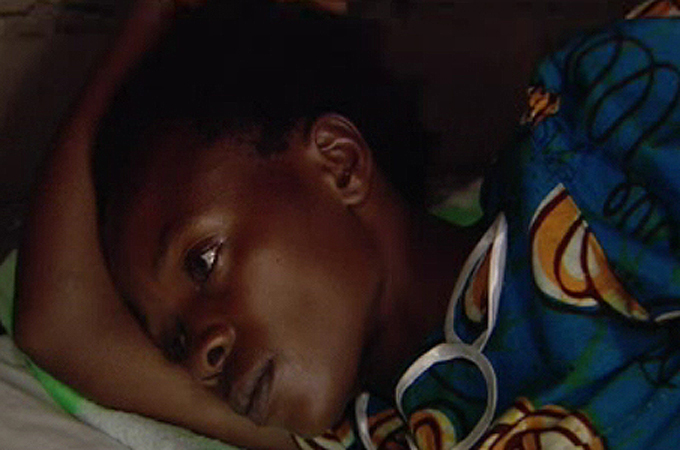
During the Democratic Republic of Congo’s five-year war, more than 80,000 women and girls were raped.
The award-winning film, Fighting the Silence, by twin-sisters Ilse and Femke van Velzen, tells the stories of rape survivors and the communities that prefer to blame the victims rather than prosecute the rapists.
Keep reading
list of 4 itemsInside the pressures facing Quebec’s billion-dollar maple syrup industry
‘Accepted in both [worlds]’: Indonesia’s Chinese Muslims prepare for Eid
Photos: Mexico, US, Canada mesmerised by rare total solar eclipse
Al Jazeera’s Rageh Omaar talks to the filmmakers about the challenges they encountered in making the film and how they are now bringing it back to the very communities it features.
Rageh Omaar: Why did you decide to do this film?
Filmmakers: We were working in Africa for quite a while, so we have made more films in Africa and we heard about the topic, about the ongoing rapes in the Democratic Republic of Congo, and there was hardly anything covered in the news.
We started in 2005 and we just wanted to give these women an opportunity to tell their story, to let the world know what’s happening there.
That was basically it, we heard about the stories, we read more and more, we got more interested and also shocked by the stories. And hardly anyone talked about it. So that was sort of our motivation to make this film and to go to DR Congo.
Was it difficult to find the women and how did you get them to talk about this subject?
| In Video |
|
|
|
Ilse and Femke van Velzen on making the film |
More Witness videos… |
For us it was not too difficult to find them.
It was a long process of research, we worked [for] one and a half years on the topic before we went to DR Congo to find women and organisations.
And the witnesses we have in the film we actually found through the activist in our film.
She had such a bond with these victims and she trusted us, and that was important. She knew why we wanted to make the story and it was very sincere.
So in this way, we met the victims and first we built up a trustable bond and they knew exactly why we were doing this and they also wanted to tell their story. That was their biggest motivation.
Was it very clear from the beginning when you met the women through the key character in the film, who is the activist, she is crucial, but once you met them was it very clear that they wanted their story told? And why did they want it told?
I must say that there are so many women raped in DR Congo and there are also a lot of women who are talking about it.
It is still a huge taboo, but the numbers are so big, that there are groups of women that are coming together and slowly breaking the silence and talking about what they went through.
| In depth |
  Coming soon on Witness Coming soon on Witness Watch the Preview: Fighting the Silence Watch the Preview: Fighting the Silence In Pictures: Fighting the Silence In Pictures: Fighting the Silence |
There are so many – like in a village everyone knows someone who has been raped.
So slowly there is a sort of conversation going and because these women are sort of helped by the activist, Chantal, they are already in the process, they already told their story the first time to Chantal and the women she worked with, so they wanted to tell their story.
And there are more women in DR Congo that want to let the world know what’s happening there.
One of the things about your film is that on one hand it explores rape as a taboo in terms of social attitude, but the other factor is, because so many women of almost all ages have been affected, it is no longer a taboo, it is an everyday part of life. Is that fair?
The difficulty in DR Congo is to understand that so many women have been raped, but it is still a huge taboo.
And that’s still the case because in a culture like when a woman is raped it is not accepted, if she has a husband and she is raped, that is unacceptable and she is the curse of the family.
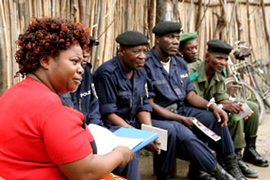 |
| Women activist Chantal in a special seminar for military and police about sexual violence |
There is one of the lines in one of the interviews of a husband of a woman who was raped. He says “it is impossible for me to share my wife with a Burundian”.
Yes, she was raped by six men and he said “how can I be the seventh?”
So that’s the taboo.
Yes, it’s just unacceptable.
There is also a lot of pressure from the community.
Even if you know that your wife has been raped, forced, then still on a man there is a lot of pressure from the community like “you cannot stay with your wife”.
They make your life really hard and in the end of the film, one of the men says: “If you stay with your raped wife, then you don’t have rest, so if you want to have sort of peace and rest, then just chase her away.”
People shout across the street “he is the one who shares his wife with soldiers” and those kinds of things. So it is so deep in the communities. It is not accepted that women have been raped, because they blame it on the women and that is very difficult for them.
Actually a reason why we made this film about what happens after women have been raped is because the hell is actually starting after they’ve already been through so much.
One of the things that comes through in the film by exploring this issue of rape is the role of women or how women are seen in society in Eastern Congo. How did you deal with that and where do you think, how are women seen in society?
| In Video |
|
|
|
Returning to Congo with a mobile cinema |
Coming soon on Witness … |
Women are seen as third class citizens. They have little rights, but on the other hand, and that’s [also the case] in a lot of other places in Africa, without the women the economy would not run.
The women do the work, but on the other hand there are just less rights.
For example the activist in our film – she is not saying it in our film, but she explained to us that when she was young she already understood the difference, like “OK, why are my brothers allowed to go to school, and why am I not allowed to go to school?”
There are loads of things. I think Chantal, the activist, she, from a young age, sort of stood up.
And she understood that there were certain things about women that they couldn’t…
Yes, and she fought against it. That’s probably why she is an activist now and she is doing really amazing work.
So there are women who are slowly, or there are women groups who are fighting for their rights and I think that’s a really good thing. But it goes really, really slow.
A lot of people who want to watch this film, will probably think ‘it is a subject that I feel very strongly about but can I watch this for an hour?’ The thing that surprised me watching it actually is, it’s horrifying and it’s shocking, but it’s also in a strange way empowering.
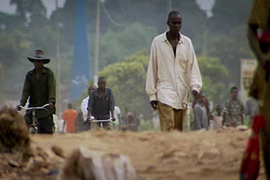 |
| Husbands get a lot of the pressure from the community to abandon their raped wives |
Yes, we find it very important to give a fair chance. They are not victims, because they are fighting hard for it, and the people everywhere in DR Congo, even though they’ve been through so much, it is unbelievable how much strength and pride they have, and that they still continue after everything that has happened.
So we did not want to portray them as victims.
because they are survivors …
Yeah, as survivors and they are fighters as well.
There is one simple question, when anyone reads about this subject and you consider that between 40, 000 and 80,000 women, I mean according to official statistics, 70,000 or more have been raped, from ages as young as three, sometimes even younger all the way through. Why? Why do you think rape which is described as a weapon, why are all parties of this war doing it? Is there an answer to that?
It is very difficult. We have been working on that topic for quite a few years and we also have the same questions. Why are the rapes going on? Why constantly? Why so many different [perpetrators] like Congolese rebel groups, the national army, groups from Rwanda, Uganda?
It is one big mess with all these different militias and a lot of victims don’t even know who raped them – was it a Burundian, or a Congolese?
And then there is also the thing, why are they using so much violence, it’s not only rape, it’s
…it’s savage, it is unspeakable…
What they do, they use rape, and that is something clearly visible in DR Congo, they use it to destroy, because if you rape a woman, then you destroy her family and the whole community built around it.
That’s it, right, that’s the knock on effect. As you said, the hell begins after the rape, not just for the women, but also for families but the whole community.
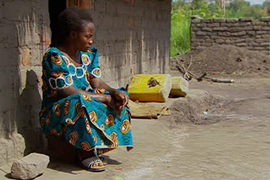 |
| Sexual violence against women continues to blight Congolese society |
Yes, in a way in DR Congo you know that if you rape a woman, she is going to be abandoned, because you break everything, you destroy.
I can understand why maybe foreign rebel groups are using it, because it is not their people, not their country.
But it is difficult to understand why the Congolese rebel groups are also doing it and that there are so many different rebel groups active.
But the impression you get from the nature of the conflict in Eastern Congo is that as Westerners one thinks of wars between different ethnic and national groups, but people and societies have moved around between the borders of Rwanda, Uganda, and Burundi, DR Congo. So there is an intimacy – that’s the other thing that comes through from this film, it’s an incredibly intimate film, but because the effects of rape are so intimate. Would you say that that’s fair?
Yeah, I think so, and I think that’s very strong also in the film, that you are really there, that you get sort of a bond with the people in the film – with the victims, but also with the husbands.
The film deals with a lot of very graphic testimony, one of the harrowing moments is when the young girl describes what’s happened to her and she looks down, and her voice is breaking. Was it difficult to get all the women in your film to talk so graphically, because it doesn’t spare any details at all?
No, first we really got a bond with them and trust and then we kept interviews very small, very intimate as they were still afraid to tell this in the open. So we just did it in their small houses and made sure there were no other people listening in.
And it surprised me, but Congolese are story-tellers. So they have it just in them that they can tell a story, but that they could tell it in so much detail was also for us a big surprise. But for the filmmaking, for their story and to bring it out it helped a lot that they were so open.
One of the things that runs through your film and what you have done subsequent to it is this one word of therapy. It’s an easy word to use, but you do get the sense whether it is Chantal, your key character, or the other women, when you’ve taken the film around, there is a sense in which people are getting this out in the open. As you say fighting the silence.
| In Video |
|
|
|
Their follow-up film: Into the heart of darkness |
More about Witness … |
I think for all the characters, especially for the victims, but also for the little girl that was raped, for them to tell their story that is a sort of therapy, also for the couples.
While we were filming them and when we have been back to DR Congo to show them the film afterwards, and you could see that by letting us film their stories, there was more understanding between the two of them for example.
So I think talking helps, but in places like the eastern part of DR Congo, there are no social workers were you can come every week for an hour and tell your story.
And it’s difficult to tell their story in a community because of the taboo.
So to have someone, whether it’s two filmmakers like yourselves, to act as a sort of a means to letting that out.
It was much easier for them to tell the story to us, than if it was maybe a Congolese for example.
So you think being Dutch, being non-Congolese actually was a definite plus?
Yeah, because there is not a lot of trust between Congolese. Because you are always afraid that maybe someone will tell it to another one and then your story is out.
And there is a lot of jealousy between different people in the village, so it was much easier.
We also had a male cameraman and a lot of people asked us “is that smart?” But in the end, they all loved our cameraman. He was great and because he was not Congolese they could actually tell their story.
One of the subjects that comes through in the film and one subject that everyone who watches it wants to know is what is to be done about this issue. The question of prosecution comes up in the film. Is that something that is widely felt amongst the survivors of rape and something that’s possible to do given the current situation in eastern DR Congo?
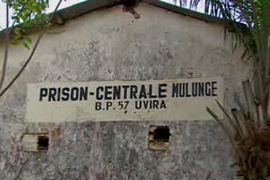 |
| A law against sexual violence was introduced but it is still difficult to get rapists into jail |
The impunity is huge and the law system is not working and there are no lawyers really – corruption is immense.
So it is very difficult for people to get their rapists into jail.
And that is one of the biggest problems still going on and that also causes a vibe now that it’s not only rebels and soldiers raping, but also normal civilians are raping because they see that you can get away with it.
And that’s something that really has to change, but the corruption is huge so it’s a difficult thing.
And also victims normally lost everything and it costs money and so much energy and the court is maybe in a different town so they need to have transport. It is almost impossible for victims to get their perpetrator
Because the structure, the system is not there at all …
Yes, but there are, in a lot of places, more and more women activists working on it and doing their best.
But even if a court is working they still have corruption, so if you get your perpetrator in prison then he can pay a little bit, or his father has a good connection with the chief of police and he is free again after a few days.
But there’s no stigma attached to this – even if a whole village knew that a guy had raped people and that news is out, it is still not a stigma is it?
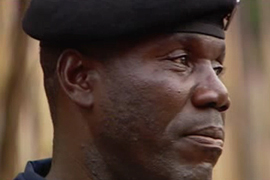 |
| Some blame the women for encouraging rapists by their behaviour or clothes |
In some places, it also depends on [the village].
In one village it is maybe not and in another village they have a different sort of mentality. So it’s very difficult to say that.
But that’s not only perpetrators of rape but just thieves in cities, because the courts are not working, you have like the public justice, so it is also happening. But not so clearly also about rape. And rape is mainly done by rebels and military so they just disappear in the forest.
But is prosecution one part of an overall solution? There are many women, many activists undertaking initiatives on many different fronts. Is that an important part of it, or do people feel it is?
I think it will make a difference.
One other thing, it isn’t a special theme in your film I just wanted to know why, is this whole issue of HIV as a consequence, as a byproduct of the rape. As you say there are many consequences to being raped – social, psychological, but also physical in terms of the damage, but also the long-term effects through thing like HIV.
Why is it not in the film?
Our victims didn’t want to go to the hospital so we didn’t have the story to follow as well and we liked to stay close to them.
But it was also at that time, when we were filming, Medecins Sans Frontieres that had their local hospital, they couldn’t give the medicine yet.
So you could go at that point to test yourself, but as soon as you were positive there was no medicine to cure it. And that’s why there is not so many figures yet so the medicines are not given out so why should you go and check yourself if there’s no help.
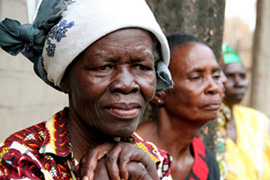 |
| More women are trying to fight the silence by telling their stories and sharing experiences |
And people don’t want to know.
It’s a huge taboo.
They’d rather not know … because then the stigma is even bigger.
The war is still going on, I think most of the time you see in different places in Africa where the war stopped, it takes a few years before HIV/Aids gets to the surface.
So the full scale of effects is not …
The other problems are bigger.
When people are dying it can be from malaria or other diseases so most of the time they die before they know or before you can see that they have HIV/Aids.
Being raped by six, seven men – these men have been raping women all over the place so, and there is so much violence, so I think the impact of Aids will be huge.